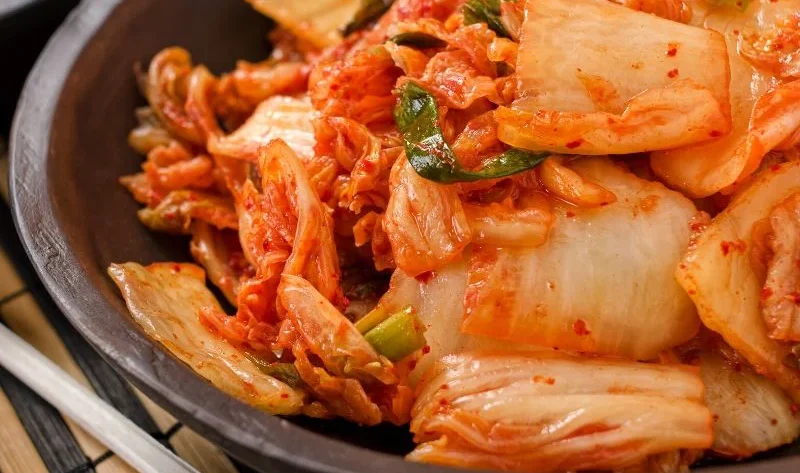Kimchi is a traditional fermented Korean dish made from a variety of vegetables, typically napa cabbage, mixed with spices and seasonings. The most common seasonings include chili pepper flakes, fish sauce, garlic, ginger, and scallions.
The origins of kimchi can be traced back to ancient Korea, where it was used as a way to preserve vegetables for consumption during the winter months. Today, kimchi is a staple in Korean cuisine and can be found in many different forms, with various ingredients and seasonings.
There are over 200 different types of kimchi, made from a variety of vegetables such as napa cabbage, radish, cucumber and even fruits like pear, and apples. Some kimchis are also made with seafood, like oysters or squid, and can be enjoyed in a traditional way, or as a side dish, or in the form of stews, soups, fried rice, and even sandwiches.
There have been several studies conducted on the health benefits of kimchi. Some of the potential benefits include:
- Improved digestion: Kimchi contains probiotics, which can help improve gut health and digestion.
- Anti-inflammatory effects: Kimchi contains compounds such as capsaicin and allicin, which have anti-inflammatory properties.
- Weight loss: Kimchi is low in calories and high in fiber, which can help with weight loss.
- Lowering cholesterol: Some studies have found that consuming kimchi can help lower cholesterol levels.
- Cancer prevention: Some compounds found in kimchi, such as sulforaphane and isothiocyanates, have been found to have potential cancer-fighting properties.
Kimchi Helps The Body Remove Difficult Fat
There have been a few studies that have investigated the potential effects of kimchi consumption on belly fat.
A study published in the Journal of Medicinal Food in 2012 found that consuming kimchi as a part of a calorie-controlled diet may lead to a reduction in abdominal fat in overweight and obese individuals. Another study published in the International Journal of Obesity in 2016 found that the consumption of fermented foods, such as kimchi, was associated with a lower risk of abdominal obesity in women.
Additionally, it’s important to remember that losing belly fat requires a combination of healthy eating and regular physical activity. Even though kimchi may have potential weight loss benefits, it should be consumed as a part of a well-balanced diet and should not be relied upon as a sole method for weight loss. Other fermented foods such as sauerkraut, kefir and kombucha have been shown to balance the microbiome and remove stubborn belly fat as well.
Turn Your Kitchen into A Probiotic Factory With The Fermentation Method –> Visit FermentationMethod.com Today!
Kimchi Reduces Neuroinflammation Of The Brain
There have been several studies that have investigated the potential effects of kimchi on neuroinflammation.
A study published in the Journal of Medicinal Food in 2012 found that kimchi extract had anti-inflammatory effects on microglial cells, which are a type of immune cell found in the brain and spinal cord that play a role in neuroinflammation. Another study published in the Journal of Functional Foods in 2016 found that kimchi consumption reduced pro-inflammatory cytokines in the brain and improved cognitive function in mice with neuroinflammation.
A study published in the Journal of Nutritional Science and Vitaminology in 2018 found that consuming kimchi for 8 weeks reduces the level of pro-inflammatory cytokines in the blood of human subjects with high blood pressure and hyperlipidemia.
Neuroinflammation Can Cause The Following Health Conditions
Neuroinflammation, or inflammation of the nervous system, has been linked to a variety of health conditions, including:
- Alzheimer’s disease
- Parkinson’s disease
- Multiple sclerosis (MS)
- Huntington’s disease
- Amyotrophic lateral sclerosis (ALS)
- Depression
- Traumatic brain injury (TBI)
- Schizophrenia
- Epilepsy
Chronic neuroinflammation may also contribute to the development or worsening of other health conditions, such as heart disease and diabetes. However, it should be noted that more research is needed to fully understand the relationship between neuroinflammation and these conditions.
What’s The Problem With Store Bought Kimchi?
With store bought foods you’re relying on the quality of the ingredients that the manufacturer decides to use. With kimchi for example, you have cabbage, ginger, garlic, chili peppers and you don’t know if they’re organic. They may be grown in soil with pesticides. You also have the water that the food is fermented in, which could very well be tap water that is full of chlorine and other chemicals you may not want to consume. Lastly, fermented foods require salt and much of the salt used on a large scale for food production is bleached, and a recent study found that over 90% of salt contains microplastics.
For these reasons, it is best to begin to ferment your own kimchi from home. In doing so you’ll control the vegetable quality, water quality and salt quality. You can turn your kitchen into a probiotic factory by fermenting your own kimchi and many other fermented foods and drinks by visiting FermentationMethod.com by clicking here.






